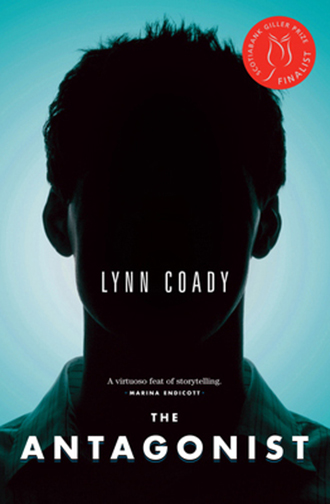Home »

I wanted to, but I didn’t get it
Book Review
By Derryll White
Lynn Coady (2011). The Antagonist
I am a fan of Lynn Coady’s ever since her collection of short stories, ‘Play the Monster Blind.’ I found her voice clear and strong through her next novel, ‘Saints of Big Harbour.’ With ‘The Antagonist’ I was excited and ready for a good read as we hadn’t heard from this author for a while.
 It starts out “It’s my life, and it’s my story,” but his name is Rank and the author is Lynn. Can a woman write a man’s life story? I was about to find out. The language is rough in the beginning, manly I guess. But when the protagonist tries to get even, instead of telling his friend to fuck off he says “… and holy shit have you ever put on weight since last we met.” Even if he is paranoid about fat, that’s not usually the way guys cut each other down.
It starts out “It’s my life, and it’s my story,” but his name is Rank and the author is Lynn. Can a woman write a man’s life story? I was about to find out. The language is rough in the beginning, manly I guess. But when the protagonist tries to get even, instead of telling his friend to fuck off he says “… and holy shit have you ever put on weight since last we met.” Even if he is paranoid about fat, that’s not usually the way guys cut each other down.
“I was born the illegitimate son of fornicators, passed like a puck to the nuns … and slapshot straight into the upstanding, two-parent home of Gord and Sylvie. Goal!” Oh, I thought, a hockey novel. All right!
But the novel is a series of e-mails. The NEW dialogue, like texting, one to another but not really so. The iconography is a little stretched. “Icy Dream” for Dairy Queen, “Java Joe” for Tim Horton. In Canada there is a DQ and a Timmy’s on every major corner, still holding more prominent place in the Canadian psyche than Starbucks or Second Cup. So why not just call them what they are?
The story unfolds as one fellow, Adam, wrote a fictional book about another fellow, Rank. So Rank in retaliation writes a book in the form of a series of long e-mails to Adam, about Adam. About how he got it all wrong. Do I have that right? And it deals with memory, which I find the most interesting concept in the work.
About page 80 I started to think, maybe it is going to get better. Rank starts talking about himself, starts revealing an intellect instead of just whine. Memory begins to morph into perspective. Things get a little disjointed; maybe it’s the e-mail style. Stories start out of nowhere and just stop. The reader is left wondering, “Is this to be continued?” The narrator mentions “celestial George Lucases writing bad sequels no one wants to see.” I am thinking, c’mon where’s the meat?
I find myself at the mid-point of the novel before something really catches my attention. All of a sudden Rank, the writer of this suffering diatribe, comes out with a discussion of death, of how it is the mirror to everything we do, the always extant possibility for each of us.
There are many glimpses of moral understanding, of analysis and possible reproof – hockey violence, a mistrustful God, violence against women – and all are called to the floor, addressed slightly and demeaned by the author. But none of it develops into meaningful dialogue or an ideological stance. Each is briefly looked at, examined broadly and then left to fade.
“I think now that anyone who believes in God, even a little, can’t help but yearn toward the evangelicals.” So here I am, more than 200 pages in and maybe catching the glimmer of a central theme. But that fades as well.
For me the best part of this novel is the memory work. The author begins to probe at the warp and weft of memory, the underpinnings and how memory changes when different perspectives are applied.
At the end, Lynn Coady’s character says it all for me. “I still don’t quite get what you were doing.” I wanted to, but I didn’t get it.
 – Derryll White once wrote books but now chooses to read and write about them. When not reading he writes history for the web at www.basininstitute.org.
– Derryll White once wrote books but now chooses to read and write about them. When not reading he writes history for the web at www.basininstitute.org.







